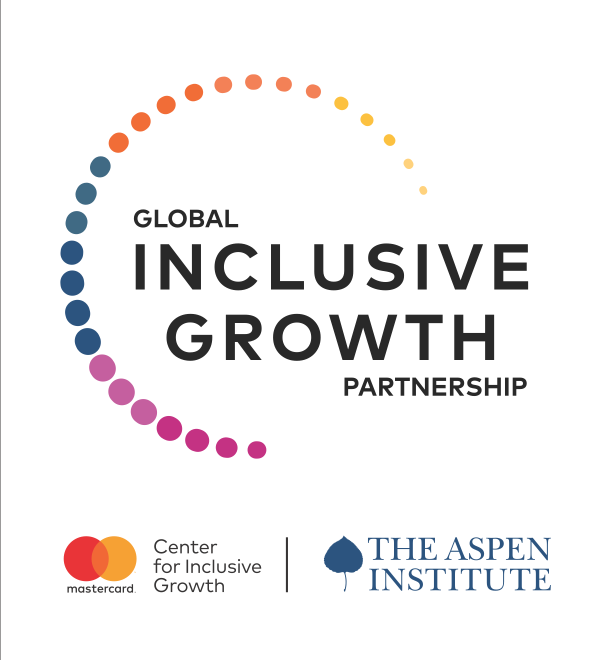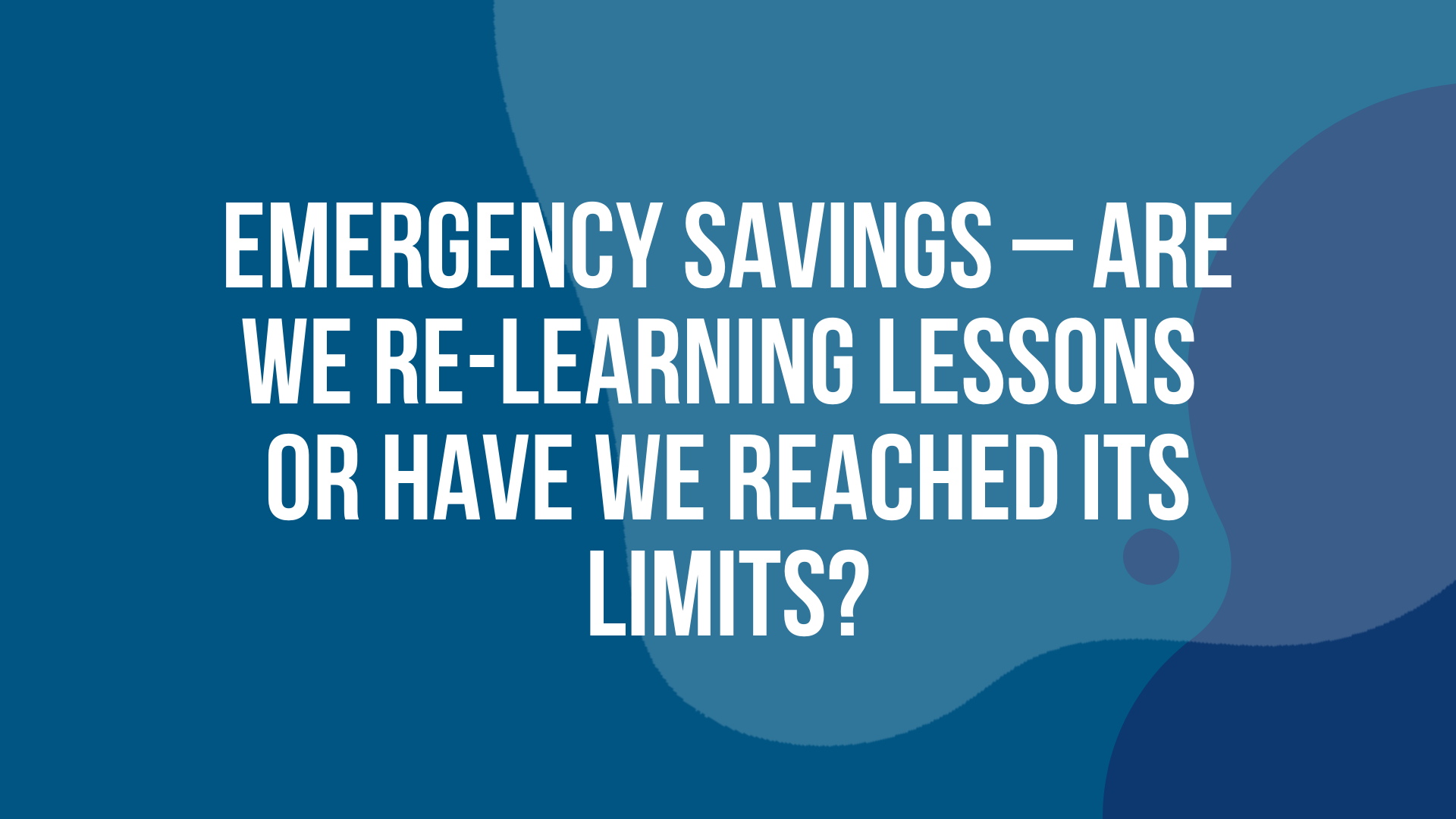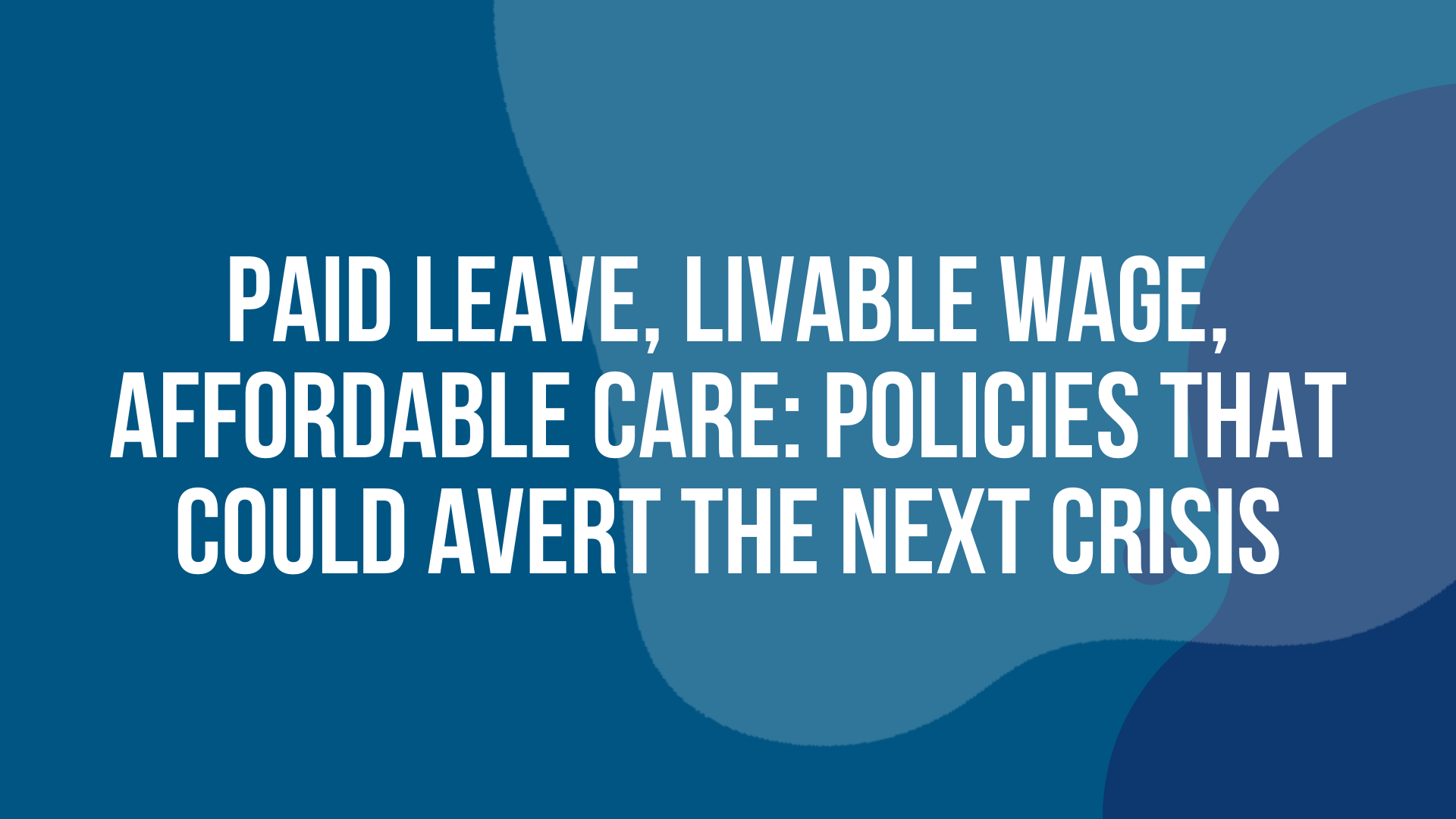Recovery, Re-Employment, and Re-Imagining Work
The COVID-19 pandemic has brought a range of challenges to workers in America. Essential workers have been left without basic protections while others struggle with care responsibilities working from home. Unprecedented millions have become unemployed while others face long hours providing needed services.
How can we address these immediate challenges while building long-term solutions? What protections do we need for essential workers today — and all workers — as we face a changing world of work? What impact will social distancing have on increasingly automated workplaces? Will new technologies introduced during the pandemic improve public health and worker safety or threaten our privacy?
Now is the moment to design a system that allows all workers and their families to achieve financial security. Join us for a discussion on what employers, the public sector, and people across the country can do to build an inclusive future of work.
 This webinar was developed as part of the Global Inclusive Growth Partnership, a collaboration between the Aspen Institute and the Mastercard Center for Inclusive Growth.
This webinar was developed as part of the Global Inclusive Growth Partnership, a collaboration between the Aspen Institute and the Mastercard Center for Inclusive Growth.
Featured Speakers
 Representative Lisa Blunt Rochester (D-DE)
Representative Lisa Blunt Rochester (D-DE)
Congresswoman representing Delaware in the U.S. House of Representatives, and Assistant Whip for House Leadership
Congresswoman Lisa Blunt Rochester represents Delaware in the U.S. House of Representatives and serves as an Assistant Whip for House Leadership. Lisa sits on the House Committee on Energy and Commerce. The committee has broad jurisdiction over health care, the environment, commerce and trade, energy policy, telecommunications, manufacturing, and consumer protection.
As the Energy and Commerce Committee’s only former statewide health official, Lisa understands health care from a number of different perspectives – as an implementer at the Delaware Department of Health and Social Services, negotiator while serving as State Personnel Director, and advocate as CEO of the Metropolitan Wilmington Urban League. Lisa is focused on reducing the cost of health care and prescription drugs for middle-class families, addressing the disparity in outcomes for communities of color, and tackling our nation’s opioid and addiction epidemic. She serves as a Member of the Bipartisan Heroin Task Force, comprised of more than 100 members united with the common goal of tackling opioid addiction.
Lisa is a leading voice in Congress on economic and future of work-related issues. As former Secretary of Labor and State Personnel Director, Lisa leverages her professional experience to advocate for legislation that boosts start-up business growth, removes barriers for citizens re-entering society, and addresses college affordability and ballooning student debt. She is a Co-Chair of the New Democrat Coalition’s Future of Work Task Force and serves as the sole Member of Congress on the Aspen Institute’s National Advisory Council for the Future of Work Initiative. She is also the founder of the Congressional Future of Work Caucus.
As a member of the Congressional Progressive Caucus and a strong proponent of reforming our criminal justice system, Lisa introduced first-in-the-nation legislation, the Clean Slate Act, sealing the federal records of former nonviolent offenders that remain crime-free and have earned a second chance. This bill would provide new opportunities for Americans to earn a good-paying job, pursue education and training, and rent or own a home. According to estimates by the Center for American Progress, the passage of the Clean Slate Act could boost the U.S. economy by as much as $87 billion per year.
Lisa also served as the Senior Executive Leadership and Systems Manager for the Institute for Community Inclusion at the University of Massachusetts Boston where she advocated for people with disabilities in their struggle for equal opportunity and civil rights. During this time, Lisa helped expand the Institute’s global footprint and advised state agencies and employers. In part due to Lisa’s work, she helped build the Institute into a fully-fledged college at the university, the School for Global Inclusion and Social Development — focused on the inclusion of all people.
Lisa currently resides in Wilmington, Delaware near her adult-aged children, Alex and Alyssa, as well as her daughter-in-law, Ebony.
 Ifeoma Ajunwa, J.D., Ph.D.
Ifeoma Ajunwa, J.D., Ph.D.
Associate Professor, Cornell University ILR School & Associate Faculty Member, Cornell Law School
A 2019 recipient of the NSF CAREER Award and a 2018 recipient of the Derrick A. Bell Award from the Association of American Law Schools, Dr. Ajunwa is an Associate Professor (with tenure) in the Law, Labor Relations, and History Department of Cornell University’s Industrial and Labor Relations School (ILR), and a Faculty Associate at the Berkman Klein Center at Harvard Law School and an Affiliate of the Center for the Study of Inequality at Cornell University. Dr. Ajunwa’s research interests are at the intersection of law and technology with a particular focus on the ethical governance of workplace technologies. Her research focus is also on diversity and inclusion in the labor market and the workplace. Dr. Ajunwa has been invited to testify before the U.S. Congress (Committee on Labor and Education), governmental agencies such as the Consumer Financial Protection Bureau (the CFPB), the Equal Employment Opportunity Commission (the EEOC), and has served as a keynote speaker at several international conferences. In addition to top law review and peer reviewed journals, Dr. Ajunwa’s writings have also been published in popular media such as the NY Times, the Washington Post, the Atlantic, the Harvard Business Review, the ACLU Blog, etc. Dr. Ajunwa earned a Ph.D. in Sociology at Columbia University in the City of New York (emphasis on Organizational Theory and Law and Society). Prior to graduate school, she also earned a law degree from the University of San Francisco School of Law where she received the AAUW Selected Professions Fellowship. Dr. Ajunwa’s forthcoming book, “The Quantified Worker,” which examines the role of technology in the workplace and its effects on management practices as moderated by employment and anti-discrimination laws will be published by Cambridge University Press in 2021.
 Anmol Chaddha
Anmol Chaddha
Director of the Equitable Futures Lab at the Institute for the Future
Anmol Chaddha leads the Equitable Futures Lab at the Institute for the Future, which develops solutions to the problems of social inequality in response to ongoing economic and technological transformations. He is currently coordinating the California Future of Work Commission created by Gov. Gavin Newsom to develop a broad agenda to promote economic equity in California. Anmol has extensive policy and social science research experience in economic inequality, racial inequality, low-wage work and job quality, debt and wealth. He previously developed policy and research at the Federal Reserve Bank of Boston on the problems of economic inequality. At the Fed, he established an initiative to improve the quality of jobs in low-wage industries, led quantitative research on racial wealth inequality, and examined the rising debt burdens of low-income families. Anmol holds a PhD from Harvard University, where he was a Fellow in the Multidisciplinary Program in Inequality and Social Policy at the Kennedy School of Government.
 Rachel Lauter
Rachel Lauter
Executive Director, Working Washington/Fair Work Center
Rachel Lauter is the Executive Director of Working Washington/Fair Work Center, a Seattle-based multi-industry workers’ rights organization that builds worker power by advocating and organizing to raise standards and win new rights on the job and by making those rights real through community-based outreach, education, and legal services. Working Washington/Fair Work Center organizing sparked the fight that won Seattle’s landmark $15 minimum wage, won secure scheduling in Seattle and paid family leave in Washington, and most recently helped pass the historic Seattle Domestic Workers Bill of Rights, protections for strippers in Washington, the most robust overtime protections in the country, and gig worker protections in the time of COVID-19. Under Lauter’s leadership, Working Washington/Fair Work Center has emerged as a national leader in raising minimum workplace standards through innovative organizing, policy, and legal campaigns.
Rachel previously served as the Deputy Chief of Staff and Director of Appointments for Mayor Bill de Blasio in New York City. Prior to joining the de Blasio administration, she served as an Assistant Counsel to Governor Andrew Cuomo and as a federal law clerk. Lauter is the co-founder of New Kings Democrats, a Brooklyn-based political organization. She is a graduate of Brown University and Harvard Law School, where she served as President of the Harvard Legal Aid Bureau, the oldest student-run legal services provider in the country.
 Shamina Singh
Shamina Singh
Founder & President, Mastercard Center for Inclusive Growth
For more than 20 years, Shamina Singh has been on the frontlines of developing and implementing solutions to make the global economy work for everyone, everywhere.
Shamina is the Founder and President of the Center for Inclusive Growth, the philanthropic hub of Mastercard. She also serves as Executive Vice President of Corporate Sustainability.
Since 2014, she has led the Center with a remit to leverage Mastercard’s data, technology, capital and expertise for social impact. In her role as EVP for Sustainability, she is responsible for the development and implementation of the environmental, social and governance strategy across the company.
In 2018, Mastercard pledged $500 million to advance inclusive growth around the world. Shamina was named President of the Mastercard Impact Fund and charged with activating those philanthropic dollars to advance inclusive growth and financial inclusion around the world.
Currently, she sits on the Boards of Data & Society and ADL, a leading anti-hate organization. In addition, she serves as a Board Member of the Ann Richards School for Young Women Leaders and the Beeck Center for Social Impact and Innovation at Georgetown University. She serves on the Advisory Boards of social enterprise Women Reignite, The Ad Council, the U.N. Business and Human Security Initiative at the London School of Economics and The Aspen Institute Civil Society Fellowship. She is also a Henry Crown Fellow with The Aspen Institute.
Deeply committed to public service, Shamina has held senior positions in the White House and the U.S. House of Representatives. In 2015, Shamina was appointed by President Obama and confirmed by the U.S. Senate to a six-year term on the Board of the Corporation for National and Community Service. She is a graduate of the Presidential Leadership Fellows program and an alum of the Young Global Leaders program of the World Economic Forum.
 Alastair Fitzpayne
Alastair Fitzpayne
Executive Director, Future of Work Initiative
Alastair Fitzpayne serves as Executive Director of the Future of Work Initiative. Prior to his work at the Aspen Institute, he served as Chief of Staff at the Department of Health and Human Services (HHS) under Secretary Sylvia Burwell. In addition to serving as Chief of Staff at HHS, Fitzpayne also held a number of senior roles at the Department of the Treasury during the Obama Administration, including Deputy Chief of Staff and Assistant Secretary for Legislative Affairs. He has also served on Capitol Hill, in both the Senate and the House, as an economic advisor to Sen. Evan Bayh and Rep. Rahm Emanuel, respectively. He has also worked at the White House Office of Management and Budget and Abt Associates, a public policy consulting firm. Fitzpayne holds a BA from Vassar College and an MPP from the University of California-Berkeley.
 Shelly Steward, PhD
Shelly Steward, PhD
Associate Director of Research, Future of Work Initiative
Shelly is an economic sociologist who studies the changing nature of work in American society. She serves as Associate Director of Research for the Aspen Institute Future of Work Initiative, where she focuses on nonstandard work, workplace benefits and protections, and the gig economy. She also teaches at the University of California’s Washington Center. Her research considers how people understand their position in the labor market and how they navigate increasing insecurity. She has studied the tech and oil and gas industries in depth, examining how people make sense of and internalize the rising risk and uncertainty of these fields. She has been a National Science Foundation Graduate Fellow, a Kinder Scholar at Rice University, and an Assessment and Evaluation Fellow at UC Berkeley. Her research has been published in the Journal of Contemporary Ethnography, the Journal of Consumer Culture, and the Berkeley Journal of Sociology, and she has been quoted in major publications including the Wall Street Journal, Washington Post, and NPR. She holds a PhD in sociology from the University of California, Berkeley and an AB from Harvard College. Prior to becoming a sociologist, Shelly taught middle school science on the Pine Ridge Reservation in South Dakota as a Teach for America corps member.
Learn more
This event is part of the Conversations in Financial Security in Response to COVID-19: How to Triage, Recover, and Stabilize series, an ongoing digital event series hosted by the Aspen Institute Financial Security Program, and is co-hosted by The Aspen Institute Future of Work Initiative. This series works to triage the immediate effects of the current pandemic, design solutions allowing households to recover, and address the structural challenges to stabilize financial security at the household level.

